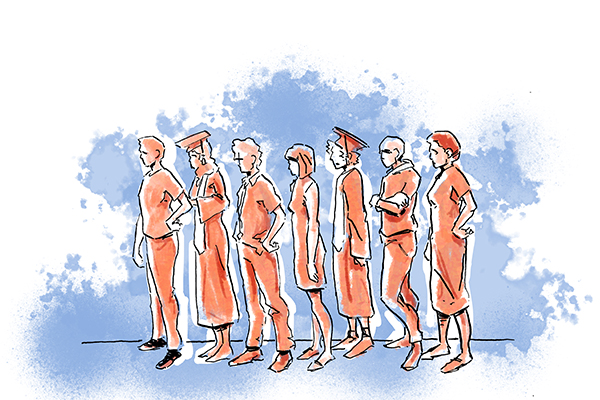After graduating from UT in May, Shahid Nowshad was eager to start working full-time as a software engineer. But when his first day arrived on June 17, Nowshad was unable to begin.
Nowshad, who’s from Singapore, is one of hundreds of international students whose employment start dates have been impacted by widespread visa delays, as reported by The New York Times in June.
“The longer I have to wait to start work, the longer I’m going without a paycheck and the longer I’m dipping into my savings,” Nowshad said.
Nowshad and the other students are waiting to receive government authorization for Optional Practical Training, a program that allows international students up to a year of employment before or after graduation in a field that is directly related to their major. Students can apply for OPT authorization up to 90 days prior to starting a job or completing their degree.
“I’m lucky that (the company) is happy to wait until I get my authorization, and I can start work once I do,” Nowshad said. “I know a lot of people using OPT for internships where there’s a limited time period with the company, and in those cases, a lot of people are losing their offers because of having to wait.”
Citizenship and Immigration Services, the agency that authorizes the OPTs, said “a surge in employment authorization requests” caused the longer wait times, according to The New York Times. While students are seeing wait times up to five months, the Times reported that the organization plans to address the issue and return to normal processing times shortly.
UT International Student and Scholar Services offers Curricular Practical Training for current international students, which requires the major-related work and internships to count toward course credit or a degree program. Margaret Luévano, interim director of ISSS, said in previous years, students could expect to receive OPT authorization within three months.
“This year, we have seen applications take three and a half to four months to be approved,” Luévano said in an email. “Since this is a personal application, only students can make an inquiry regarding the status of applications. ISSS can provide guidance on how to do so.”
Nowshad said because the government website doesn’t offer much information on the status of his application, he has been getting his information from other international students.
“Right now, all that the site said is ‘case received,’ and it’s going to show that until it’s been approved or not,” Nowshad said. “You sort of have to go by anecdotal evidence of what your friends are going through. It’s honestly quite anxiety-inducing.”
While waiting for OPT authorization, Nowshad said international students are also advised against leaving the country.
“It’s risky to travel out of the country during this in-between period of after graduation but before you’ve got OPT approval,” Nowshad said. “Trying to come back into the U.S. will be tricky because you basically don’t have anything to show that you’re in the U.S. for a legal reason.”
Raymond Guyandi, an international student who graduated in May, said he hasn’t been able to go home to Indonesia.
“I was planning to go abroad with my family and some friends and go back to Indonesia to visit my grandparents and my extended family before I start working full time,” Guyandi said. “That kind of fell apart because I don’t want to take the risk of going out of the country and not being able to get back in the U.S.”
As his job start date in July approaches, Guyandi said he is still anxiously waiting for his Employment Authorization Document.
“Last week, I found out that my EAD is not going to arrive within 90 days,” Guyandi said. “I’m probably going to have to start late, and I’m super fortunate to have an employer who is understanding.”
Despite the delay in starting work, Nowshad said he is grateful to be in the U.S.
“In general, the U.S. is still a very welcoming place for immigrants,” Nowshad said. “In some sense, everyone who is an international student knows they’re quite lucky to be here.”




















